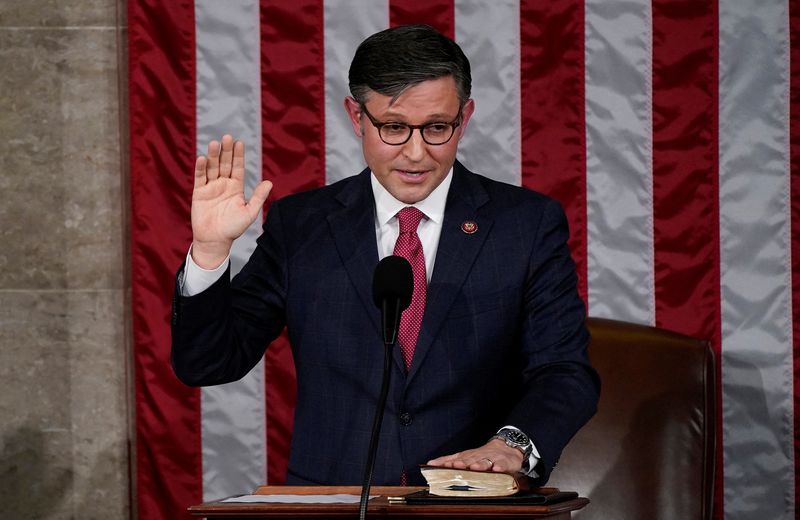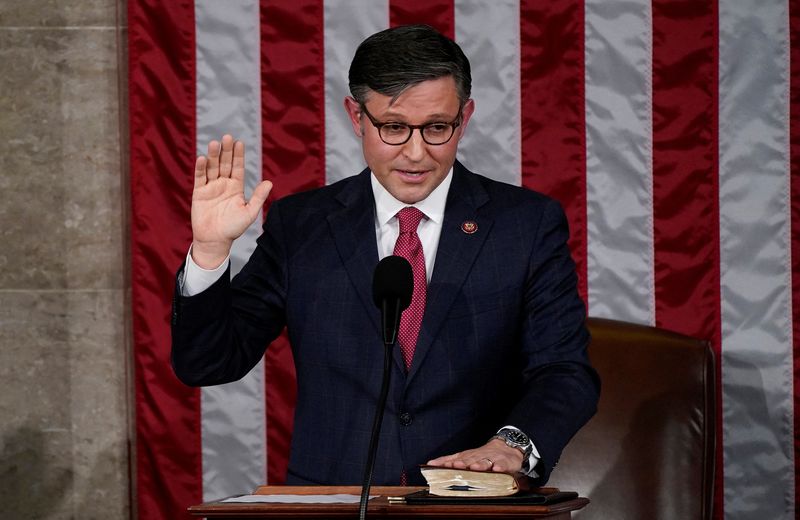Economy
New US House Republican speaker faces early test on government funding


© Reuters. Newly elected Speaker of the House Mike Johnson (R-LA) takes his oath of office after he was elected to be the new Speaker at the U.S. Capitol in Washington, U.S., October 25, 2023. REUTERS/Elizabth Frantz/File Photo
By David Morgan
WASHINGTON (Reuters) – Republican Mike Johnson, the untried speaker of the U.S. House of Representatives, faces an early test of how well he can unify his splintered majority as he tries to avoid a partial government shutdown a little more than two weeks away.
The four-term lawmaker from Louisiana will try to pass three 2024 spending bills, which could help placate hardline conservatives, before turning to a stopgap measure to keep federal agencies funded past Nov. 17.
But tensions between party hardliners and centrists, which led to the historic ouster of Johnson’s predecessor early this month, threaten to undermine the bills, which would fund the legislative branch; transportation, housing and urban development; and the Department of the Interior and the environment through Sept. 30.
“They’re at risk,” said Representative Don Bacon, a centrist Republican from Nebraska who warned that hardline demands for deep spending cuts could further split the conference.
Johnson has already heeded hardliners’ demands by calling for a Thursday vote on a $14.3 billion bill to aid Israel in its war with Hamas. He has severed that aid from funding for Ukraine, despite objections by Democrats and some Republican moderates, and by seeking to pay for the aid by cutting money Democrats allocated to the Internal Revenue Service.
Senate Majority Leader Chuck Schumer, the top Democrat in Congress, said he was “deeply troubled” by the move.
“The new speaker knows perfectly well that if you want to help Israel, you can’t propose legislation that is full of poison pills,” Schumer said on the Senate floor.
‘LITMUS TEST’
The plan to offset aid to Israel with money for the federal tax collection agency also undermines the Republican goal of fiscal austerity. The nonpartisan Congressional Budget Office reported on Wednesday that the loss of money to the IRS will reduce federal revenues by nearly $27 billion and add $12.5 billion to the federal deficit over the coming decade.
The Israel aid and appropriations measures pose an early test of Johnson and his narrow 221-212 majority’s ability to agree among themselves and to work with Democrats, who hold the Senate majority and the Oval Office.
“This will be a litmus test,” said Representative Ryan Zinke, a Republican who sits on the House committee that sets spending priorities. “There’s going to be some groaning and moaning, but I think they’ll pass.”
The U.S.’s budget deficit soared to $1.7 trillion in the fiscal year ended Sept. 30, the highest outside the COVID-19 era. Rising interest rates, the high costs of the Social Security and Medicare programs and the lingering effects of a 2017 tax cut have pushed the nation’s debt over $33 trillion.
Hardliners are pressing for spending cuts and policy wins, such as tighter border security, as part of any temporary funding measure known as a continuing resolution, or “CR,” to avoid a partial government shutdown.
Former Speaker Kevin McCarthy was ousted by a small band of hardliners after agreeing to pass a CR with Democratic support. The intraparty brawl that followed has left many Republicans wary of picking another shutdown fight.
“We just wasted three weeks with whatever this last goat rodeo was,” said Representative Kelly Armstrong of South Dakota. “It’s very difficult for members in tough districts to go home and explain any reason for a shutdown right now.”
That raises the likelihood of Johnson ultimately opting for a “clean” CR without conditions or spending cuts.
Johnson has floated the idea of a CR that would run into January or April and cut spending 1% across the board – including defense.
In their full-year bills by reassigning previous allocations for Democratic programs to their own priorities, House Republicans have proposed spending a net $34.8 billion on Interior and the environment, a 10% overall cut with a 39% reduction for the Environmental Protection Agency, according to a Republican fact sheet.
With a similar use of previously allocated money, House Republicans would spend a net $65.2 billion on transportation, housing and urban development, 25% below current levels.
The third bill, which funds congressional operations, could be in trouble because of opposition from Republicans who say a 4.6% cost of living adjustment for lawmakers – their first in 15 years – is unconstitutional.
Even if passed, the House Republican bills have no chance of succeeding in the Democratic-led Senate or being signed into law by Democratic President Joe Biden.
But Republicans believe they can strengthen their hand in spending negotiations with the Senate by passing all 12 bills for fiscal 2024, which began on Oct. 1.
“We need to utilize the new opportunity with the new speaker to take steps to at least demonstrate that we’re taking this seriously,” said Representative Bob Good, a hardline conservative from Virginia.
Economy
Russian central bank says it needs months to make sure CPI falling before rate cuts -RBC


© Reuters. Russian Central Bank Governor Elvira Nabiullina attends a news conference in Moscow, Russia June 14, 2019. REUTERS/Shamil Zhumatov/File Photo
MOSCOW (Reuters) – Russia’s central bank will need two to three months to make sure that inflation is steadily declining before taking any decision on interest rate cuts, the bank’s governor Elvira Nabiullina told RBC media on Sunday.
The central bank raised its key interest rate by 100 basis points to 16% earlier in December, hiking for the fifth consecutive meeting in response to stubborn inflation, and suggested that its tightening cycle was nearly over.
Nabiullina said it was not yet clear when exactly the regulator would start cutting rates, however.
“We really need to make sure that inflation is steadily decreasing, that these are not one-off factors that can affect the rate of price growth in a particular month,” she said.
Nabiullina said the bank was taking into account a wide range of indicators but primarily those that “characterize the stability of inflation”.
“This will take two or three months or more – it depends on how much the wide range of indicators that characterize sustainable inflation declines,” she said.
The bank will next convene to set its benchmark rate on Feb. 16.
The governor also said the bank should have started monetary policy tightening earlier than in July, when it embarked on the rate-hiking cycle.
Economy
China identifies second set of projects in $140 billion spending plan


© Reuters. FILE PHOTO: Workers walk past an under-construction area with completed office towers in the background, in Shenzhen’s Qianhai new district, Guangdong province, China August 25, 2023. REUTERS/David Kirton/File Photo
SHANGHAI (Reuters) – China’s top planning body said on Saturday it had identified a second batch of public investment projects, including flood control and disaster relief programmes, under a bond issuance and investment plan announced in October to boost the economy.
With the latest tranche, China has now earmarked more than 800 billion yuan of its 1 trillion yuan ($140 billion) in additional government bond issuance in the fourth quarter, as it focuses on fiscal steps to shore up the flagging economy.
The National Development and Reform Commission (NDRC) said in a statement on Saturday it had identified 9,600 projects with planned investment of more than 560 billion yuan.
China’s economy, the world’s second largest, is struggling to regain its footing post-COVID-19 as policymakers grapple with tepid consumer demand, weak exports, falling foreign investment and a deepening real estate crisis.
The 1 trillion yuan in additional bond issuance will widen China’s 2023 budget deficit ratio to around 3.8 percent from 3 percent, the state-run Xinhua news agency has said.
“Construction of the projects will improve China’s flood control system, emergency response mechanism and disaster relief capabilities, and better protect people’s lives and property, so it is very significant,” the NDRC said.
The agency said it will coordinate with other government bodies to make sure that funds are allocated speedily for investment and that high standards of quality are maintained in project construction.
($1 = 7.1315 renminbi)
Economy
Russian central bank says it needs months to make sure CPI falling before rate cuts -RBC


© Reuters. Russian Central Bank Governor Elvira Nabiullina attends a news conference in Moscow, Russia June 14, 2019. REUTERS/Shamil Zhumatov/File Photo
MOSCOW (Reuters) – Russia’s central bank will need two to three months to make sure that inflation is steadily declining before taking any decision on interest rate cuts, the bank’s governor Elvira Nabiullina told RBC media on Sunday.
The central bank raised its key interest rate by 100 basis points to 16% earlier in December, hiking for the fifth consecutive meeting in response to stubborn inflation, and suggested that its tightening cycle was nearly over.
Nabiullina said it was not yet clear when exactly the regulator would start cutting rates, however.
“We really need to make sure that inflation is steadily decreasing, that these are not one-off factors that can affect the rate of price growth in a particular month,” she said.
Nabiullina said the bank was taking into account a wide range of indicators but primarily those that “characterize the stability of inflation”.
“This will take two or three months or more – it depends on how much the wide range of indicators that characterize sustainable inflation declines,” she said.
The bank will next convene to set its benchmark rate on Feb. 16.
The governor also said the bank should have started monetary policy tightening earlier than in July, when it embarked on the rate-hiking cycle.

 Forex2 years ago
Forex2 years agoForex Today: the dollar is gaining strength amid gloomy sentiment at the start of the Fed’s week

 Forex2 years ago
Forex2 years agoHow is the Australian dollar doing today?

 Forex1 year ago
Forex1 year agoUnbiased review of Pocket Option broker

 Forex2 years ago
Forex2 years agoDollar to pound sterling exchange rate today: Pound plummeted to its lowest since 1985

 Cryptocurrency2 years ago
Cryptocurrency2 years agoWhat happened in the crypto market – current events today

 World2 years ago
World2 years agoWhy are modern video games an art form?

 Stock Markets2 years ago
Stock Markets2 years agoMorgan Stanley: bear market rally to continue

 Economy2 years ago
Economy2 years agoCrude oil tankers double in price due to EU anti-Russian sanctions

































